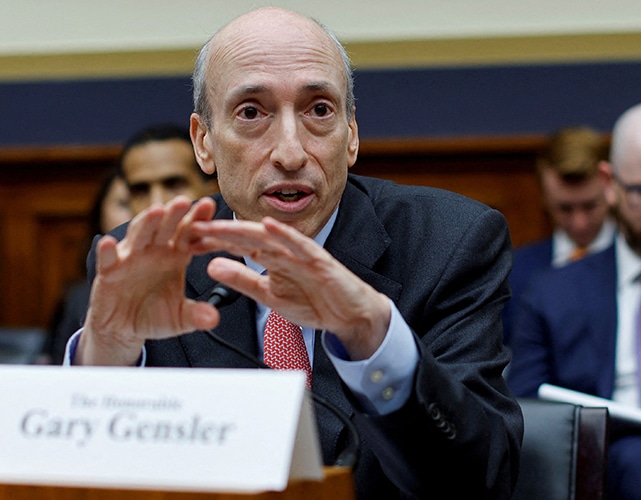Buoyed by the successful launch of U.S. bitcoin exchange-traded funds (ETFs), asset managers are lining up to list a second wave of more complex crypto products, setting the stage for another tussle with the U.S. securities regulator.
The Securities and Exchange Commission (SEC) rejected spot bitcoin ETFs for more than a decade, hoping to protect investors from market manipulation. But the SEC was forced to approve them last month after Grayscale Investments won a court challenge. A federal appeals court ruled that the SEC had not sufficiently detailed its reasoning for rejecting the products.
That decision encouraged 12 asset managers, including Grayscale, ProShares, VanEck, Invesco, Fidelity and Ark Investments to file applications to launch 25 next-generation cryptocurrency ETFs.
Many are complex products that would use options to amplify bitcoin’s volatility. Others would track the price of ether, the No. 2 cryptocurrency after bitcoin.
Investors hope the new products will help drive crypto further into the mainstream. Bitcoin surpassed $61,000 on Feb. 28 for the first time in over two years and ether has climbed more than 12% this year on hopes the SEC will approve the spot products.
No Rush for Approvals
Yet the SEC remains uncomfortable with cryptocurrencies and complex exchange-traded products, and lawyers and industry sources said they expect the agency to move cautiously. The legal status of ether is also ambiguous, they noted.
“It doesn’t seem like there’s a rush to approve a second wave of products,” said Yesha Yadav, a professor focusing on digital asset regulation at Vanderbilt University, adding the SEC would have to “grapple with” how much risk it can stomach.
SEC Chair Gary Gensler remains a crypto critic, and when approving the bitcoin ETFs, he warned they were highly risky and said the decision did not signal the SEC was willing to approve listing standards for crypto assets more broadly.
An executive at one issuer said it was unclear whether SEC approval of the bitcoin ETFs would pave the way for other products.
Some applications before the SEC are for products designed for day traders: Leveraged exchange-traded bitcoin products would seek to juice returns by further amplifying the cryptocurrency’s significant volatility. Other applications are for inverse products that allow speculators to bet on a decline in the price.
ETFs and Leverage
The SEC has approved many inverse and leveraged ETFs, but has been cautious after a volatility-tracking exchange-traded note went bust in 2018, costing investors $2 billion in losses. In 2020, it capped ETF leverage at 200%, and the agency is due to review its rules on ETF risks this year, according to its regulatory agenda.
Gensler and Democratic SEC Commissioner Caroline Crenshaw have also warned about risks of inverse and leveraged ETFs. The SEC would only formally stop these products from launching if it found their disclosures to be materially misleading, people familiar with the matter said, but they added it could delay the effective date of a filing or suggest an issuer withdraw it if staff have concerns.
James Angel, associate professor of finance at Georgetown University, said the SEC would likely avoid outright rejection of applications, which could invite a legal challenge.
“I think they will look for every possible detail or excuse they can to delay the process,” he added.
There is no clear process for SEC approval of options on the bitcoin ETFs, which have usually been approved days after an ETF launch, so approval could take months going forward, Reuters reported this month.
ProShares, Invesco, Fidelity and Ark Investments declined to comment or did not respond to requests for comment.
Ether Clash?
Because the spot ether ETFs would be a new product and require a rule change, the SEC must approve or deny them by a set deadline. VanEck’s filing is first in line for a decision on May 23, while the deadline for Grayscale’s ether application is June 18.
The SEC has yet to engage substantively with issuers on the applications, but is expected to begin meetings next month, said two other people familiar with the matter. The agency has not yet disclosed meetings on the products in its public log.
Asked about the spot ether ETF filings this month, Gensler told CNBC the SEC’s five commissioners would review them. Both Democrat commissioners voted against the bitcoin ETFs, while the two Republicans voted for them. That means Gensler would likely have the deciding vote.
The arguments Grayscale used to defeat the SEC in its bitcoin ETF suit could apply to the ether products because the circumstances are similar. But some regulatory experts and issuers said Gensler could argue ether is a different type of asset.
The SEC has said bitcoin is a commodity, but has not made a determination on ether. Unlike bitcoin, ether is traded on a so-called “proof-of-stake” blockchain that allows users to earn yield in exchange for locking up tokens for a period of time. Gensler has questioned whether this setup resembles a traditional security.
“There are different circumstances the SEC will consider. The biggest circumstance is that they consider bitcoin to be a commodity and not a security,” said Frank Borger Gilligan, a securities attorney at Dickinson Wright who said the SEC would want assurances that any new products had investor safeguards.
Asked by CNBC last week if it will take another lawsuit to force the SEC to approve ether ETFs, Grayscale CEO Michael Sonnenshein said it was “too early to say.”
This article was provided by Reuters.







